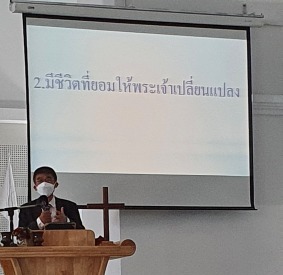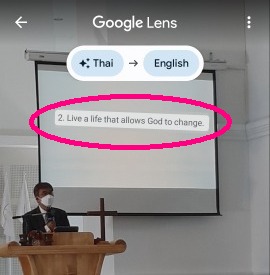Have you ever wondered why missionaries need to spend so much time learning another language? Many people think that it’s simpler to just speak English with Thai people. “Surely enough Thais can speak English by now,” they say. “Why can’t we just share the Gospel in English? Even better – the smart phone translation apps are amazing these days! Can’t missionaries can just use this to communicate with Thais who can’t speak English?”

 With this in mind, I thought I’d check out the latest version of Google Lens yesterday at church. I took a photo of one of the preacher’s points on the screen. Then I looked at this in Google Lens. The resulting translation? “Live a life that allows God to change.” Obviously something went wrong with this!!
With this in mind, I thought I’d check out the latest version of Google Lens yesterday at church. I took a photo of one of the preacher’s points on the screen. Then I looked at this in Google Lens. The resulting translation? “Live a life that allows God to change.” Obviously something went wrong with this!!
The problem is this – language is complicated. It requires a knowledge of culture and of the current context.1 In fact, if you don’t know a country’s culture, you can’t speak their language. Because cultural background shapes a language and is part of the communication process, the greater the cultural difference, the greater the difficulty in speaking and understanding the new language. This means that it’s much easier for a native English speaker to learn French or German than it is to learn an Asian language – the cultural backgrounds are much, much more different.
To make the challenge even more difficult, many Asian languages are high context languages2. A high context language assumes that those talking together understand the context based on the social status of those talking, facial and body language, the location and even the time of day. Much information is left out of the words used because those talking together already understand this background context. This is in great contrast with low context languages (such as English) that include a lot of the information in the words spoken – because the speakers realize that the respective background of each person might be somewhat different. Translation programmes work great with low context languages, but smart phones and computers don’t have the ability to work out all that is going on in the background to make them effective at translating high context languages.
So it looks like translation apps – even though useful in a pinch – aren’t sophisticated enough to effectively translate a language accurately, and therefore shouldn’t be used to communicate the Christian message.
What about speaking English in Thailand. While 27% of Thais speak some English, many people put the number of fluent English speakers at 5-10%. Education First rank the average proficiency in English as “very low”.3 In fact, the average Thai person’s ability to speak English compared to that of other countries comes in at number 100 out of 112 ie. there are 99 other countries where the locals speak English better than Thais. When just looking at Asia, Thailand comes 22nd out of 24 countries.
Knowing all this, and knowing that the Christian message is a vital and deep message of God’s love for the world and his instructions on how we should live, should we really communicate in a language that the majority of Thais can’t understand very well? Shouldn’t we take the effort to go where the Thai people are and speak the language that they speak so that they too will have a chance to know the great mysteries of God? Considering how much Jesus went through in order to become human like us, spending a few years learning Thai language doesn’t seem like such a sacrifice after all.
Oh, and by the way – the preacher was sharing from Romans 12:1-2 yesterday. His point was that we should live in a way that allows God to change us. But the only reason I know what he was saying is that I took the time to learn Thai.
----------------------------------------
1 See https://www.britannica.com/topic/language/Language-and-culture
2 See https://www.cbsnews.com/news/this-is-why-they-dont-understand-you-overseas/
3 See https://www.ef.com/wwen/epi/regions/asia/thailand/


